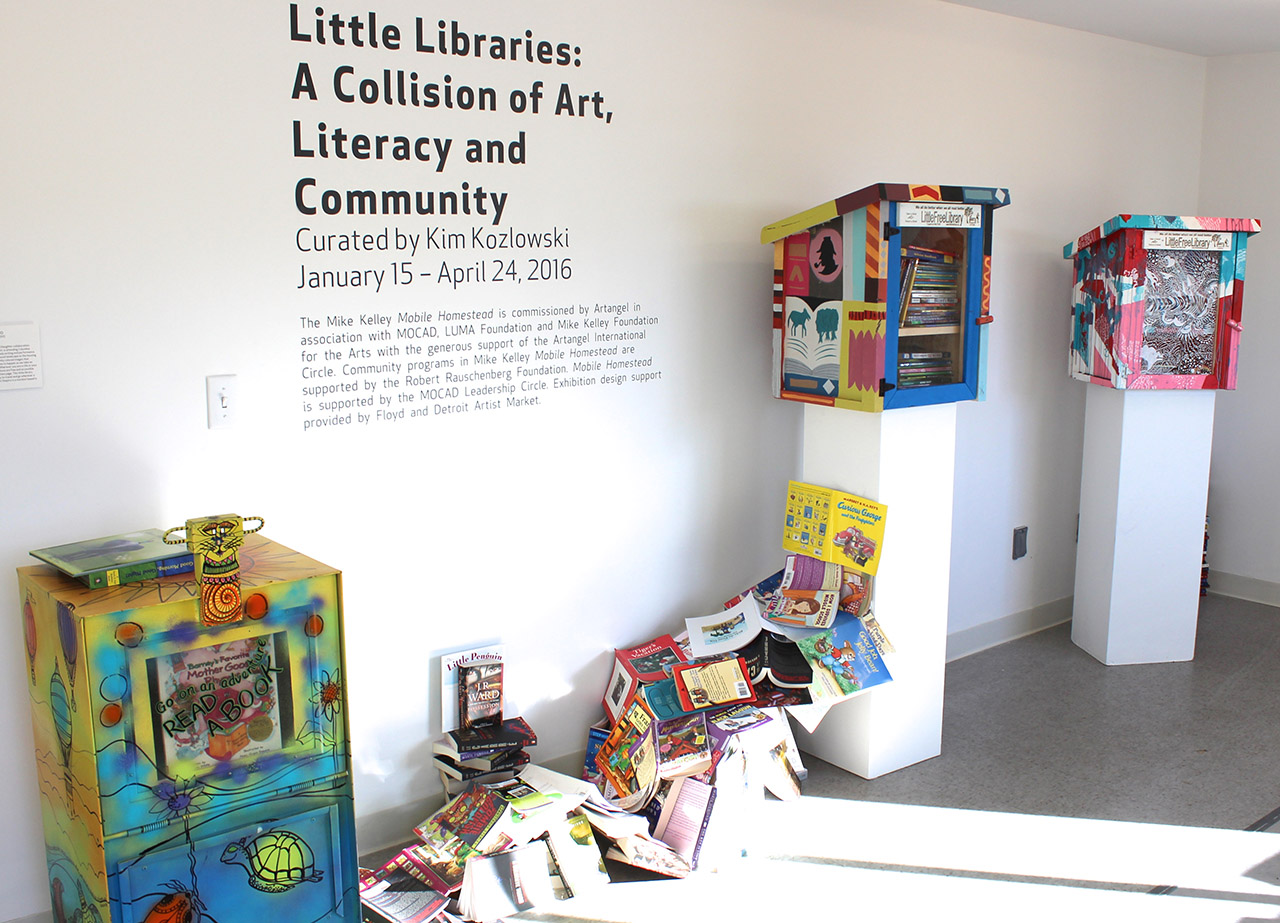
Exhibit brings together artists’ visions for Detroit’s Little Libraries
Above: The “Detroit Little Library Originals” exhibit will run at the Museum of Contemporary Art Detroit’s Mobile Homestead through April 24.
If you build, they will read.
That seems to be the underlying conceit of the Little Free Library movement, founded in 2009 in Hudson, Wis., by a man named Todd Bol. Since his first Little Library, the idea of distributing free books on a take-one, leave-one basis out of eye-catching, publicly mounted boxes has become a bona fide international craze, sparking localized efforts to create a network of 30,000 Little Libraries in communities all around the world.
For Kim Kozlowski, the idea of Little Libraries in Detroit took hold in 2014, and since then, she has vowed to make the city the Little Library capital of the world. In a place where an estimated 47 percent of adults are functionally illiterate, the need for community-based support of reading is undeniable. Starting with a donation of 20 library boxes from Bol in November of 2014, Kozlowski has been a tireless advocate for the construction, dissemination and stewardship of Little Libraries all across the city.
To date, Detroit Little Libraries has partnered with organizations including Rx for Reading Detroit, a nonprofit literacy group; Detroit SOUP, a Knight Arts grantee that supports social entrepreneurs; Detroit Parks; General Motors; Chrysler; and the End Grain Woodworking Co., which builds many of the Little Libraries from reclaimed wood salvaged from abandoned Detroit houses.
The libraries stand in community gardens, parks and outside schools, as well as in front of the homes of stewards who request them and are responsible for their care and maintenance (one sits outside the Write-A-House, another Knight Arts grantee). This stewardship includes getting the word out to communities about the existence of the library, making sure the library is kept stocked with appropriate books, and repairing boxes in the case of elemental damage or vandalism. The basic libraries are typically freestanding, mounted on posts and resembling large birdhouses with a windowed front door that offers a glimpse into their contents; however, the format leaves much room for imagination.
In an effort to raise the profile of the Little Libraries movement in Detroit, and to demonstrate its wide range of possibilities, Kozlowski organized a group of local artists to apply their imaginations and talents to a series of special Little Libraries, currently being displayed at the Museum of Contemporary Art Detroit’s Mobile Homestead—a perfect fit for the facility’s mission of participatory and social practice art. On Saturday, Jan. 23, Kozlowski moderated an artist panel with five of the participating artists, who shared their motivations and inspiration for the boxes they created. (The MOCAD is a recipient of multiple Knight Arts grants.)
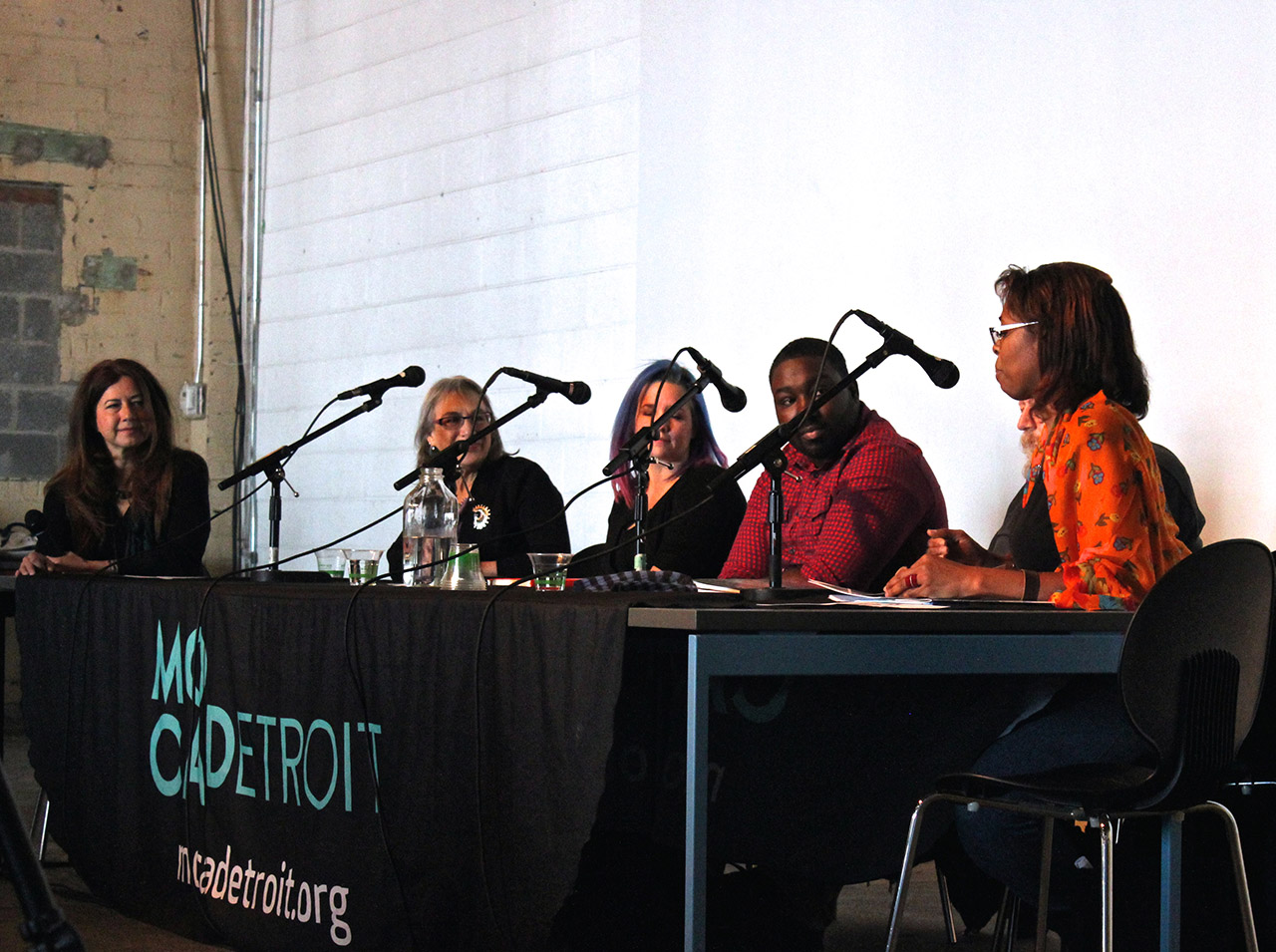
Saturday’s panel discussion, with Kim Kozlowski (left), Barbara Barefield, Kelly O’Hara, Ndubisi Okoye, Eno Laget (not visible) and Debora Grace.
The panel included Barbara Barefield, who is a champion of the Little Library and other arts-based efforts in the Palmer Park and Palmer Woods area. Her box, “Sweet Reading,” is embellished with an angel and a mermaid, both happily reading, and affords previews of the books inside through peek-a-boo windows all around the box. She sees a strong desire for books in her neighborhood. “The box in Palmer Park is always empty, no matter how many times a day we put books in there,” she said.
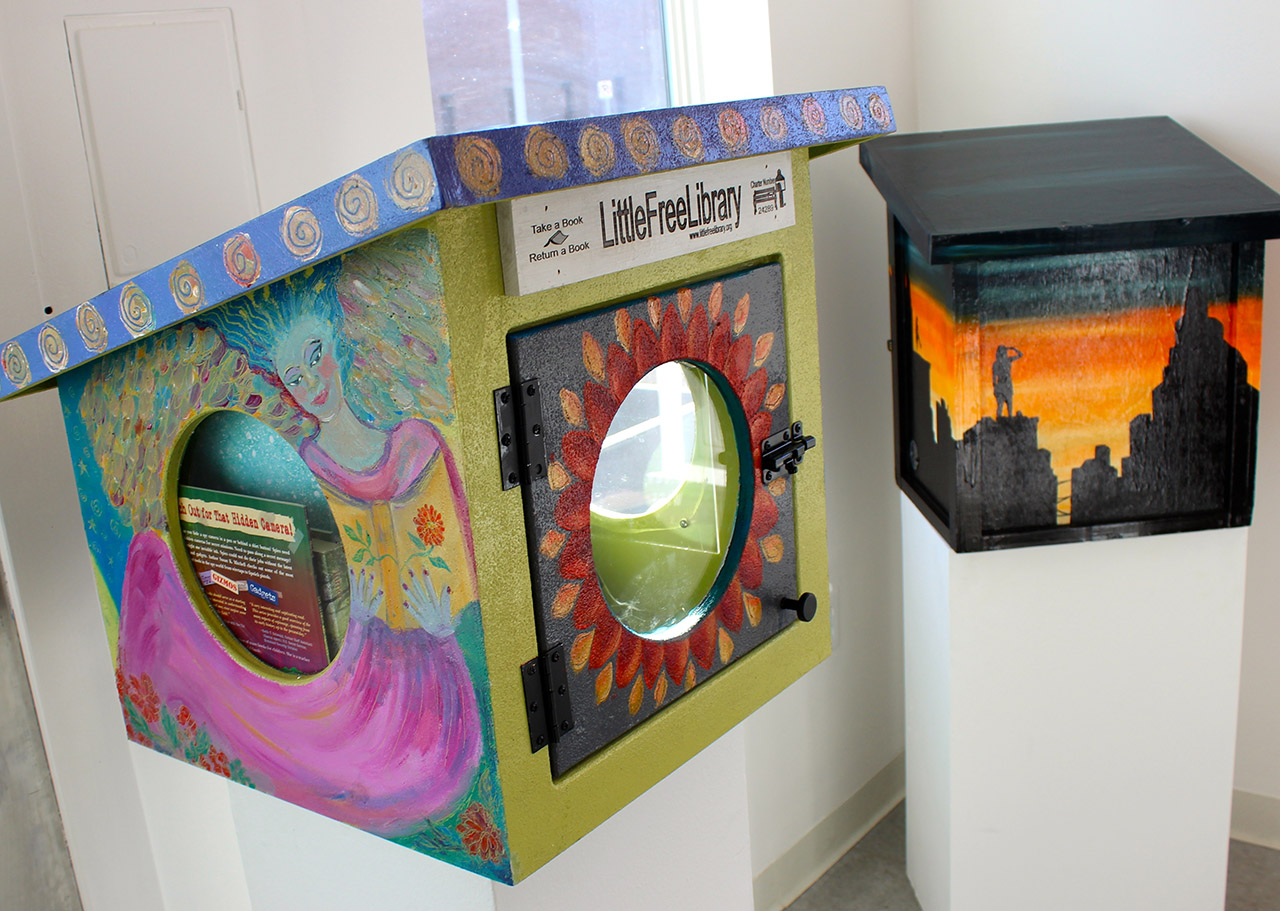
Barefield’s “Sweet Reading” (left) and O’Hara’s “City at Sunset.”
Next to her was Kelly O’Hara, whose library, “City at Sunset,” borrowed imagery from her forthcoming graphic novel, creating a freestanding piece of sequential art. “I had multiple libraries near me growing up,” O’Hara stated. “This was a good opportunity to give back and make that possible for others.” O’Hara partnered with Studio Two on Alter Road, identifying it as a place where kids in the neighborhood were already turning up to explore art and culture.
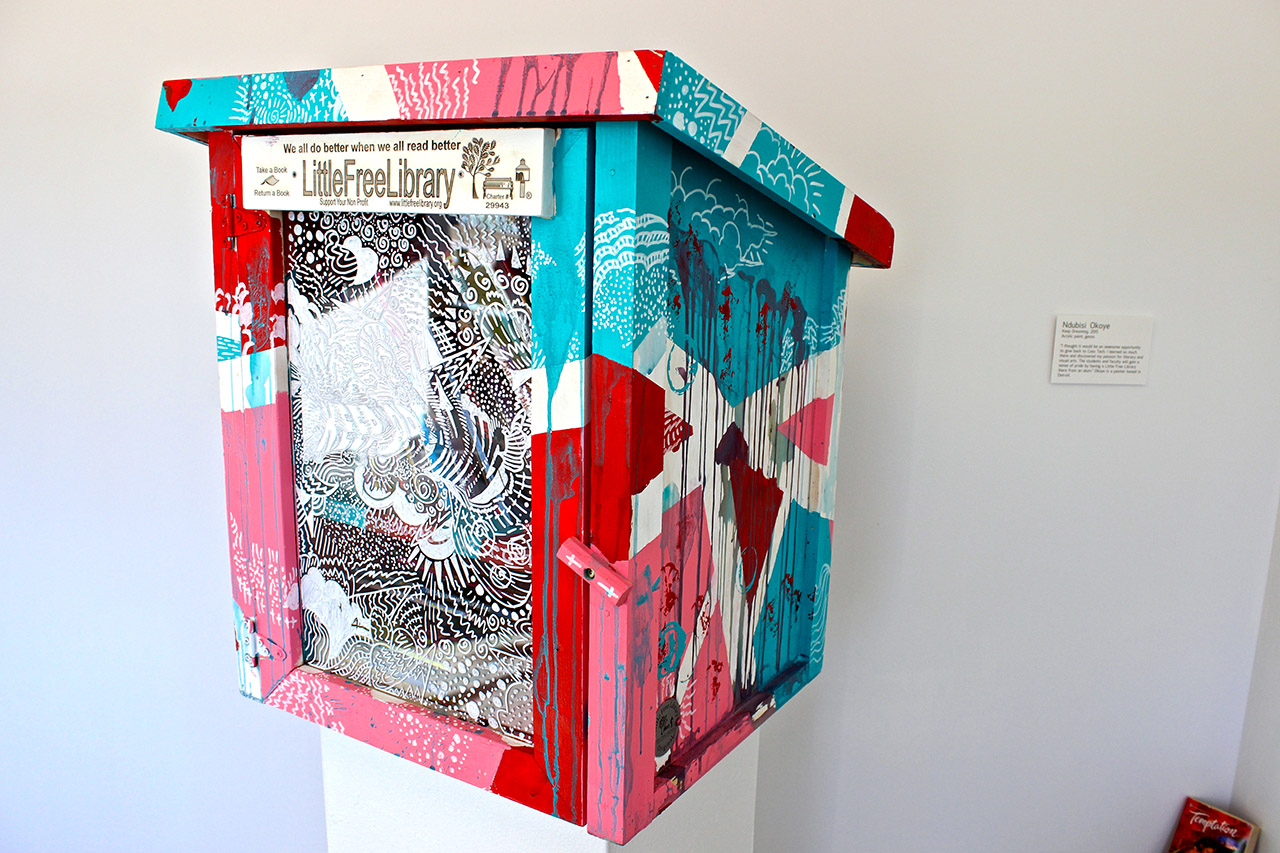
Okoye’s “Keep Dreaming.”
In the middle of the panel was Ndubisi Okoye, a Detroit-based painter who created his library with his alma mater of Cass Tech in mind as the location. “I was all for it, especially because the literacy rate in Detroit is so low,” Okoye said. The box’s title, “Keep Dreaming,” makes clear the message that he would like to parlay to the students at Cass Tech. Similarly, Eno Laget, who worked for decades at the “Detroit News,” was delighted to get to repurpose and redecorate a former newspaper distribution box into an allegorical library. The motif of “12 Jewelz” features a portrait of Malcolm Little (who became Malcolm X), among others, and refers to the 12 jewels of Islam. He spoke of the power of transformation and the impediment of illiteracy. “I’d like to think we can do something about that,” Laget said.
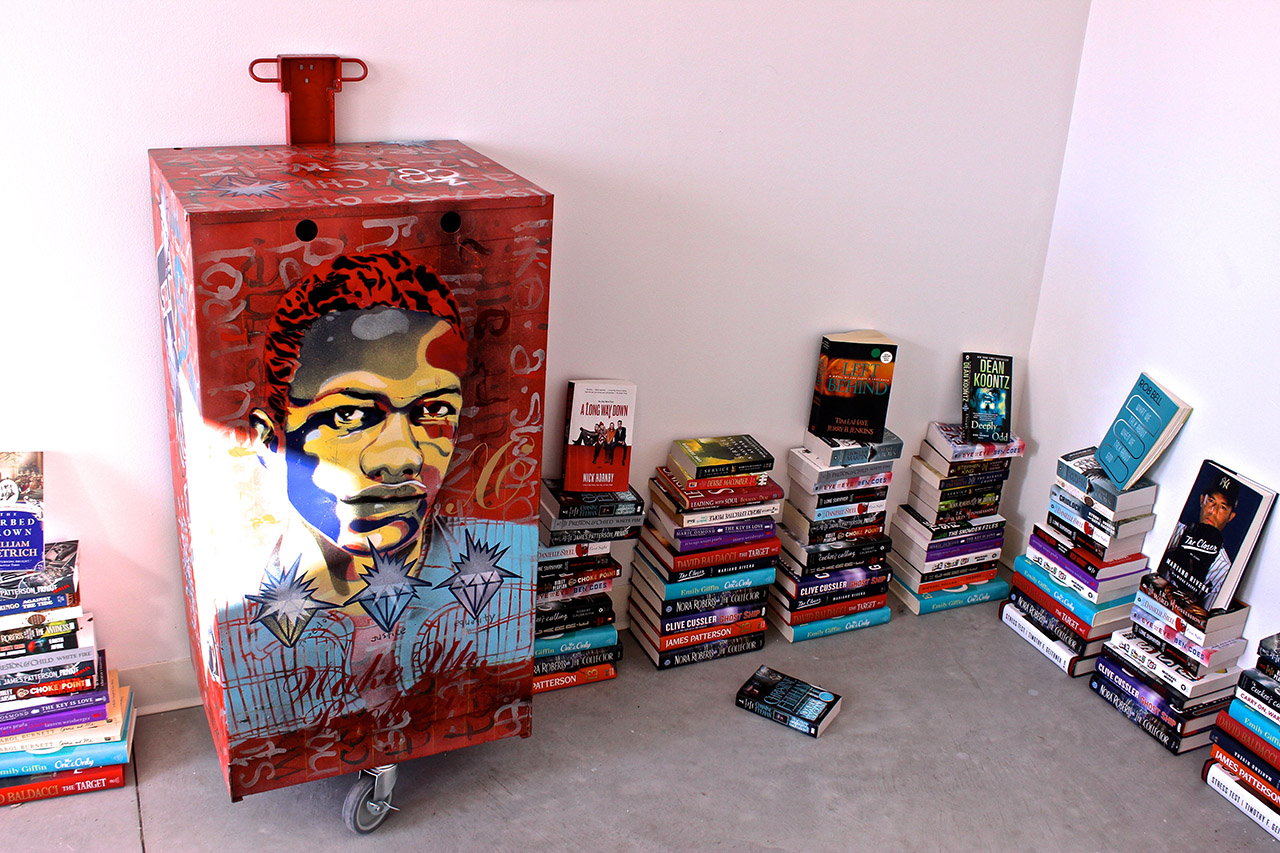
Laget’s “12 Jewelz,” featuring a portrait of Malcolm Little.
The final member of the panel was Debora Grace, who gave her library box, “Forever Free,” a “wordscape” treatment in bright bumblebee colors. “Detroit is used to receiving punches in the face,” Grace said. “Let’s build people up. There’s no better way of doing that than with a book.”
Many issues were raised in the Q&A that followed the panel, including strategies for collecting books, challenges posed by getting libraries into certain areas, and the few instances of pushback, where the libraries have been vandalized or destroyed. It begs the question, in a city with such a high illiteracy rate, how helpful is it to distribute books without there being help learning to read? On this, Laget waxed philosophical, suggesting that the Little Libraries were not the end-all solution, but a community rallying point—a way of demonstrating interest and need in better solutions, ones that can only be worked out by working together.
For its part, the Mobile Homestead will be hosting an exciting run of library-related activities during the three-month Detroit Little Libraries exhibition, including story-reading events and a presentation of prints and drawings by author Dave Eggers, founder of 826 learning labs. The newest facility in the 826 reading labs, a Knight Arts grantee, is also slated to open in Detroit later this year.
It remains to be seen whether the Detroit Little Libraries are a passing fad or a successful rallying point for a new focus on literacy and connectivity. But the efforts of Kozlowski, her band of dedicated artists and stewards, and the engagement across many communities strikes a hopeful note for progress in the city. As Grace said during the panel, “Putting a book in the hands of anyone in the city is giving them hope.”
In addition to regular open-exhibit hours at the Mobile Homestead, the next events surrounding the “Detroit Little Library Originals” exhibit are Storytime with Mary Grant of the Detroit Association of Black Storytellers on Jan. 31 and Storytime with Charlie LeDuff, a Pulitzer Prize-winning reporter formerly at The New York Times and The Detroit News, on Feb. 28. A complete list of events can be found on the Detroit Little Libraries website.
Recent Content
-
Artsarticle ·
-
Artsarticle ·
-
Artsarticle ·

